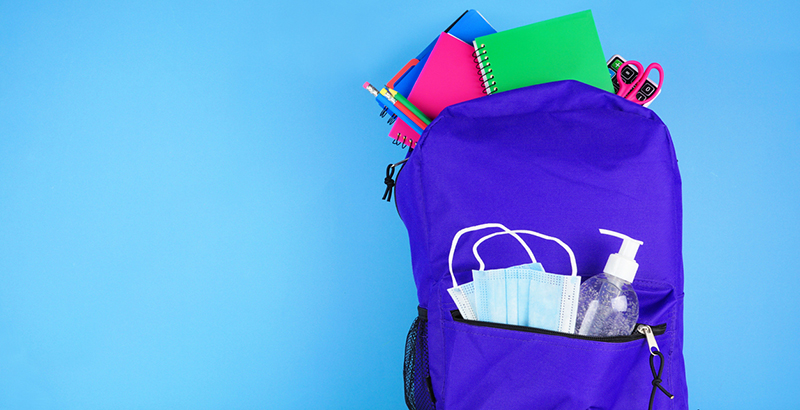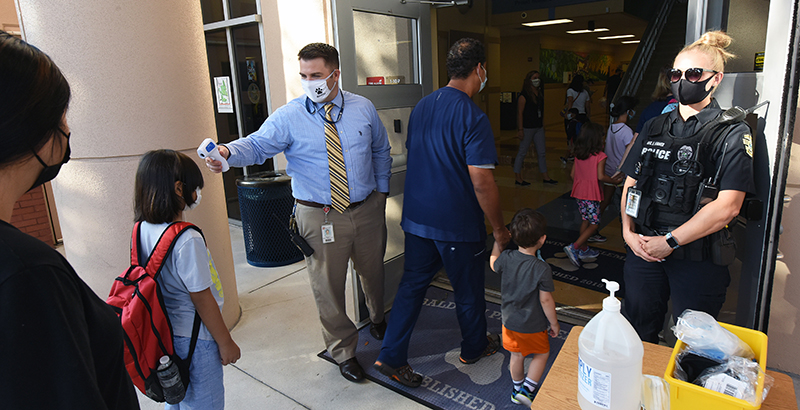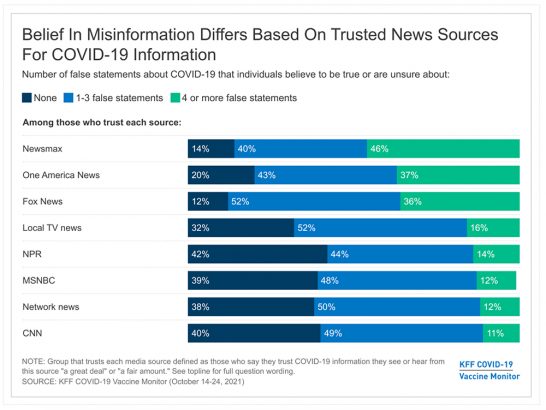The Week in COVID & Education Policy: New Study Concludes Benefits of In-Person School Outweigh Risks, Families Facing ‘Ubiquitous’ Misinformation & More

This is our weekly briefing on how the pandemic is shaping schools and education policy, vetted, as always, by AEI Visiting Fellow John Bailey. Click here to see the full archive. Get this weekly roundup, as well as rolling daily updates, delivered straight to your inbox — sign up for The 74 Newsletter.
New Research — COVID-19, Children & the Cost-Benefit of In-Person Learning: Via Science
- “One of the main concerns with the full reopening of schools was the risk of in-school transmissions leading to large outbreaks, with onward transmission to household members and potentially into the wider community. In England, PHE surveillance found that most schools did not experience a COVID-19 outbreak.”
- “When they did occur, more than half involved only two cases before they were controlled, most likely because of mitigation measures: frequent sanitization, physical distancing, class bubbles, staff masking, and rapid testing with lateral flow devices and isolation of cases and their bubble contacts.”
- “That infection and outbreaks occur in educational settings is undeniable and likely reflects a combination of factors, including local community infection rates and inadequate in-school mitigations.”
- “The number of mitigation measures, rather than individual measures, are important in preventing in-school transmission.”
- “Therefore, although school closures may contribute to reducing transmission, by themselves, they would be inadequate in preventing community transmission and, consequently, the benefits of in-person schooling outweigh the risks, especially in countries where adults are fully vaccinated against COVID-19.”

November 12, 2021 — The Big Three
Pfizer Antiviral Pill: Pfizer released data showing that its antiviral pill can vastly reduce hospitalizations and death (press release).
- “Pfizer’s pill, which will be sold under the brand name Paxlovid, cut the risk of hospitalization or death by 89% when given within three days of the start of symptoms.”
- “Pfizer said an independent board of experts monitoring its clinical trial had recommended that the study be stopped early because the drug’s benefit to patients had proved so convincing.”
- The company plans to submit the data as soon as possible to the FDA to seek authorization for the pill to be used in the U.S.
- Reuters explains how Merck’s COVID-19 pill compares to Pfizer’s.

COVID-19 Misinformation is Ubiquitous: Via Kaiser Family Foundation
- 78% of U.S. adults either believe or aren’t sure about at least one of eight false statements about the COVID-19 pandemic or COVID-19 vaccines, with unvaccinated adults and Republicans among those most likely to hold misconceptions.
- 60% say they’ve heard that the government is exaggerating the number of COVID-19 deaths by counting deaths due to other factors and either believe it to be true (38%) or aren’t sure if it is true or false (22%).
- 39% say they’ve heard pregnant women should not get the COVID-19 vaccine and believe it to be true (17%) or aren’t sure (22%).
- “Larger shares of those who trust COVID-19 information from leading conservative news sources believe misinformation, with nearly 4 in 10 of those who trust Fox News (36%) and One America News (37%), and nearly half (46%) of those who trust Newsmax, saying they believe or are unsure about at least half of the eight false statements.”
Policymakers Should Have Prioritized an Operation Warp Speed Addressed at Preventing Widespread Learning Losses: Argues Scott Winship in The Dispatch.
- “Understandably, both schools and federal policymakers were scrambling in the initial weeks and months of the pandemic.
- “However, after the initial policy response in March and April, and once kids limped out of the 2019-20 school year, federal policymakers should have prioritized an Operation Warp Speed addressed at preventing widespread learning losses that could damage a generation of children and permanently reduce the wealth of our nation.”
- “The poorest families today are better off than the poorest families in earlier generations, but it is still a problem if upward mobility is low — if children who have the lowest-earning and least-educated parents with the least desirable jobs end up in a similar place themselves.”
- “My own estimates indicate that about half of men raised in the bottom fourth of family income subsequently remained in the bottom fourth as adults.”
- Read more at The Dispatch
Federal Updates
U.S. Education Department: Secretary Miguel Cardona says there should be “no need” for hybrid or remote learning after kids are vaccinated.
Secretary Cardona and Surgeon General Vivek Murthy: USA Today op-ed: As we recover from the pandemic, we must focus on our children.
Federal Communications Commission: Commits $421 million in additional Emergency Connectivity Funding
- “The program to date has committed to supporting 6,954 schools, 613 libraries, and 80 consortia, which are approved to receive over 6.8 million connected devices and over 3.5 million broadband connections.”
It’s Finally Infrastructure Week: The House passed the Bipartisan Infrastructure Bill just before midnight last Friday. The president is expected to sign it later this week.
- 13 Republicans voted in favor of it while 6 Democrats voted against it.
- White House Fact Sheet and more detailed microsite.
- Among the provisions are $65 billion for broadband infrastructure. Three programs important for those working in education:
- $42 billion provided to all states through a formula to build out broadband infrastructure in areas with little access or high cost. States are encouraged to use these funds to connect community anchor institutions which includes schools, hospitals, public housing, and institutions of higher education.
- $14.2 billion is given to the FCC for an Affordable Connectivity Fund (formerly known as the Emergency Broadband Benefit (EBB) Program). These funds will provide low-income households with $30 per month to cover home Internet access.
- $2.75 billion is available for two grant programs that will promote digital equity.
City & State News
California Schools: Get Vaccinated or Go Back to Distance Learning: “Nearly 350,000 California students face an imminent choice: Get vaccinated for COVID-19 or stay home,” Politico reports.
- “Monica Gandhi, an infectious disease expert at the University of California, San Francisco who has been influential during the pandemic, said she supports childhood vaccines and that her own child will get a COVID shot. But she questioned the legality of districts imposing a mandate before the FDA actually approves the vaccine for most school-age children and sympathized with parents who are still processing their decisions.”
- “There’s not a single other place that’s doing this. It’s new and it may take some time for people to feel comfortable with it — it may take six to eight months,” Gandhi said. “It’s totally understandable and justifiable that parents at this point want to wait for more safety data. It’s really important for parents to have some time.”
- “Gandhi withdrew her support for Newsom’s vaccine mandate last week out of frustration that there is no plan to eliminate mask requirements once students get their COVID shot. She said the state and school districts are being unnecessarily tougher on children than adults.”
- “I am not prepared to vote on anything that could force over half of the Black and brown students out of the district because they are currently not vaccinated. I don’t understand how we would move forward with that without having a plan,” Oakland Unified School Board member Mike Hutchinson said last week.”
Arizona: A for Arizona announces Arizona Transportation Modernization Grant awardees.
- Description of 24 grantees. Some really creative proposals using technology for route optimization, expanding fleets of vehicles, a SAFE (Sharing with All Families access to Education) Driver App, and a micro-transit van program.
Georgia: State education department launches effort to locate and support up to 50,000 rural students who have disengaged from school during pandemic.
Illinois: Two pediatricians write an op-ed: “Chicago schools should require the COVID-19 vaccine for students.”
New York: The state launched a College Scholarship Vaccine Incentive for kids 5-11.
- “The state will select 50 names of children who will receive a full ride to a SUNY or CUNY institution for college.”
- More than 4,500 New York City students ages 5 to 11 got vaccinated on the first day of the citywide in-school drive.
Pennsylvania: Gov. Tom Wolf will let the school mask mandate expire in January.
Texas: New UT/TT poll finds that 57% of voters support mask requirements in indoor public spaces based on local conditions, while 58% support mask requirements in public schools.
West Virginia: Gov. Jim Justice announces $150 school supplies vouchers now available for vaccinated children ages 5-11.
COVID-19 Research
Evaluation of the Pfizer Vaccine in Children 5 to 11 Years of Age: New England Journal of Medicine study with the Pfizer data.
- “Direct benefits of preventing SARS-CoV-2 infection in children include protection against severe disease, hospitalizations, and severe or long-term complications, such as [multisystem inflammatory syndrome in children].”
- “Indirect benefits include the likelihood of reduced transmission in the home and in school settings, including transmission affecting vulnerable persons, and safer in-person learning.”
- “The robust virus-neutralizing response observed in 5-to-11-year-olds was similar to that seen in 16-to-25-year-olds from the pivotal trial, which demonstrated 95% vaccine efficacy among persons at least 16 years of age from 7 days to approximately 2 months after the second dose.”
Quarantine Elimination for K–12 Students With Mask-on-Mask Exposure to COVID-19: New paper that explored the impact of eliminating quarantine for students with mask-on-mask exposures to COVID-19 on associated secondary transmission in schools.
- “18,632 students and 2,855 staff attended in-person learning; 1,856 primary infections were among students and staff.”
- “Despite 3,947 student quarantines in the fall and 1,689 student quarantines in the first 10 weeks of spring semester instruction, there were only 2 cases of secondary transmission.”
- “A local policy change removed quarantine requirements for students with mask-on-mask exposure to COVID-19 cases. Required quarantines in the spring semester reduced by 41% per primary infection compared to the fall; no student who qualified to avoid quarantine developed a secondary infection.”
- “School-based COVID-19 transmission was exceptionally low in this large K–12 Nebraska school district.”
Should You Vaccinate Your 5-Year-Old?: Wall Street Journal op-ed by Dr. Nicole Saphier, an assistant professor at Memorial Sloan Kettering Cancer Center and Weill Cornell Medical College and Dr. Marty Makary, a professor at the Johns Hopkins School of Medicine and editor-in-chief of MedPage Today.
- “The risk is extremely low either way. The CDC estimates that 42% of U.S. children 5 to 11 had COVID by June 2021, before the Delta wave—a prevalence that is likely greater than 50% today.”
- “Of 28 million children in that age range, 94 have died of COVID since the pandemic began (including deaths before newer treatments), and 562 have been hospitalized with COVID infections.”
- “Serious complications are so uncommon in this age range that of 2,186 children in the Pfizer vaccine study, no child in either the vaccine or placebo group developed severe illness from COVID.”
- “There’s an important exception, though: If a child already had COVID, there’s no scientific basis for vaccination. Deep within the 80-page Pfizer report is this crucial line: “No cases of COVID-19 were observed in either the vaccine group or the placebo group in participants with evidence of prior SARS-CoV-2 infection.”
- “Natural immunity is likely even more robust in children, given their stronger immune systems. An indiscriminate COVID vaccine mandate may result in unintended harm among children with natural immunity.”
Pfizer Asks the FDA to Authorize a Booster Dose for Everyone Over 18: Official request.
- “The FDA could clear the request by the end of the month, according to health officials who spoke on the condition of anonymity because they were not authorized to discuss the issue. The officials are concerned about studies showing waning vaccine protection, as well as increased infections in parts of the United States,” the Washington Post reports.
Kids and Masks: We know the upsides of masks. Emily Oster explores the downsides.
New Vaccine Campaign Targets Rural Americans: The Guardian reported on a new series of public service messages launched by the Ad Council and the COVID Collaborative. Make sure to watch Craig & Leslie and this one featuring Brooks Hodges was powerful.
Unvaccinated People Are 20 Times More Likely to Die of COVID: “During the month of September, Texans not vaccinated against COVID-19 were 20 times more likely to die from Covid-19-related complications and 13 times more likely to test positive than people who were fully vaccinated, according to a new study by the Texas Department of State Health Services,” the Dallas Morning News reports.
A School-Based SARS-CoV-2 Testing Program: Testing Uptake and Quarantine Length Following In-School Exposures: New paper.
- “24 schools, including 12,251 in-person learners, participated in the study. During the pre-implementation period, 446 close contacts were quarantined for school-related exposures; 708 close contacts were quarantined after implementation.
- “After in-school testing implementation, close contacts missed (on average) 1.5 less days of school.”
- “Providing access to in-school testing may be a worthwhile mechanism to increase testing uptake following in-school exposures and minimize missed days of in-person learning, thereby mitigating the pandemic’s ongoing impact on children.”
The Promise of School-Based COVID-19 Testing Programs in Underserved Populations: New paper in Pediatrics.
- “The largest barrier identified across projects was the limited perceived advantages of COVID-19 testing among school stakeholders when weighed against the perceived burden of testing in schools (ie, ‘relative advantage’).”
- “Obtaining consent forms also emerged as a challenge across projects, and our teams presented a wide variety of strategies to overcome this barrier. First, consent forms must be in formats that are relevant to the local context, including online or paper and in multiple languages. Use of plain language writing techniques, particularly for settings serving children with disabilities, is strongly encouraged.”
- “Implementation of school-based testing requires heavy data tracking and reporting. Local public health agencies can be critical in helping to facilitate this process.”
- “Testing for COVID-19 holds promise for making schools safer during the COVID-19 pandemic and can offer lessons for future infectious disease outbreaks and pandemics.”
Urban Classification, Not COVID-19 Community Rates, Was Associated With Modes of Learning in K–12 Schools: New paper in Pediatrics.
- Five states were included in the analysis: Michigan, Missouri, North Carolina, Ohio, and Wisconsin.
- “No relationship between mode of learning and community COVID-19 rates was observed. County urban classification of school location was associated with mode of learning with school districts in nonmetropolitan and small metropolitan counties more likely to be in-person.”
- “Community COVID-19 rates did not appear to influence the decision of when to provide in-person learning.”
- “More schools in nonmetropolitan counties provided in-person learning as compared to schools in higher density areas.”
Secondary Transmission of COVID-19 in K-12 Schools: Findings From Two States: New paper in Pediatrics.
- “With universal masking, in-person education was associated with low rates of secondary transmission, even with less stringent distancing and bus practices. Given rates of sports-associated secondary transmission, additional mitigation may be warranted.”
Costa Rica: Issues COVID-19 vaccine requirement for children.
Trump Surgeon General Encourages Vaccinating Kids: Dr. Jerome Adams, who served as U.S. surgeon general under former President Trump, said that he will be getting his 11-year-old daughter vaccinated against COVID-19 as the benefits clearly outweigh the risks.
- “It’s really just about doing everything we can to protect our children and give them the best possible chance of growing up healthy and strong,” Adams told Fox News.
It’s Time to Contemplate the End of the Crisis: Writes Monica Gandhi in The Atlantic.
- “But within two or three months of introducing vaccines for 5-to-11-year-olds, the U.S. should be able to begin winding down most of the formal and informal limits to which Americans have become accustomed — office closures, masking mandates, educational interruptions, six-foot distancing, and more.”
Rich Countries Have Given Out More Boosters In Three Months Than Poorer Countries Have Given Total Doses All Year: Via The Financial Times.
Viewpoints
The Childhood Vaccine Debate Ignores a Crucial Point: Kids Aren’t Supposed to Die: Op-ed in Time by Dr. Jeff Vergales and Dr. Monica Gandhi:
- “The argument that kids are, for the most part, unaffected medically by COVID-19 ignores a simple, yet essential, premise. Children are not supposed to die.”
- “To put this in perspective, COVID would currently rank 6th in the list of reasons that children die every year in the United States. Trauma (including motor vehicle accidents, drownings, firearm incidents, suffocation and other injuries) dominate the majority of childhood death and drives advancement of seatbelt laws, car seat laws, firearm laws, and swimming pool laws to reduce this number.”
- “Yet, none of these conditions have a preventative strategy as profoundly effective as immunity to COVID-19. We vaccinate children to prevent severe illness and death, not to prevent mild disease. It is the same reason that pediatricians emphasize influenza vaccination — not to prevent all kids from getting the flu — but to protect children who should not be hospitalized and die.”
- “Most American parents have never been in a serious car accident, yet they don’t think twice about insisting their children ride in car seats and use seat belts. Why is this? The rate of fatal car crashes as a factor of how often we drive is thankfully low—and similar to fatal rates from COVID. Yet, if a car crash were to occur, the seatbelt may be the only true protection from harm. Simply put, kids buckle up to ensure if on the rare chance a serious car accident occurs, it will have a low likelihood of leading to death.”
No Home Left Offline: New EducationSuperHighway campaign (report / press release / The 74) with four pillars:
- Building awareness that affordability, not infrastructure is now the primary barrier to closing the digital divide;
- Creating a recurring data source to identify unconnected households;
- Ensuring that a sustainable funding source is available to close the affordability gap; and
- Designing and piloting programs to bring free broadband to our target communities.
Parent Awareness and Economic Barriers Shaping the Future of Supplemental Learning Pods: New report from Tyton Partners and the Walton Family Foundation
- The number of parents adopting supplemental learning pods continued to increase in spring 2021, climbing to 14% from 12% of all parents surveyed during the fall 2020.
- By late spring of 2021, supplemental pods incorporated many elements of traditional K-12 education, making it easier for parents to integrate them into their daily routines. More than half were hosted at a school location and facilitated by a certified teacher.
- Motivation for parents who adopted these types of pods primarily fell into one of three segments, depending on the goal they were trying to achieve for their child: academic support, academic enrichment and social-emotional learning.
Office-Based Mental Healthcare and Juvenile Arrests: An NBER paper found that ten additional office-based mental healthcare providers in a county leads a decrease of 2.3% to 2.6% in the per capita costs to society of juvenile arrest.
Outschool.org Opportunity: Outschool’s nonprofit affiliate is currently seeking applications for its Community Partners grant. The grant provides free Outschool classes and support to schools, districts, nonprofits and homeschooling co-ops whose students are at least 75% of color or low-income.
How Reopening Decisions Affected Public School Disenrollment: Via Fordham Institute
Equitable Value Explorer: The Bill & Melinda Gates Foundation released an interactive website that students can use to evaluate more than 4,000 colleges and universities on factors such as racial composition of the student body, net cumulative price of attendance, completion rates, the percentage of students receiving Pell Grants, and median earnings ten years after enrollment.
What New Data Reveal About Students’ Math and Reading Performance Right Now: EdWeek reports on a new report from Curriculum Associates.
…And on a Reflective Note
The 50th New York City Marathon: Was last weekend. Among the runners: a duck.
- I haven’t checked the eligibility rules but it seems like a clear fowl.
- And I loved this: Man falls 650 feet from finish line, carried across by other runners.
- More inspiration: Cancer nearly took his life. But the New York City Marathon awaited.
The real champion.. ? pic.twitter.com/oEt69t91zp
— Buitengebieden (@buitengebieden_) November 8, 2021
ICYMI @The74
Weekend Reads: In case you missed them, our top five stories of the week:
- Elections: Will the Tea Party of 2022 Emerge from the Debate over Schools? Virginia Election Offers GOP Template for Midterms
- Photo Essay: Inside a Vaccine Site for Kids: A Brooklyn Pharmacy Becomes A Comforting Spot for COVID Shots
- Critical Race Theory: Lone Star Parent Power: How One of the Nation’s Toughest Anti-Critical Race Theory Laws Emboldened Angry Texas Parents Demanding Book Banning, Educator Firings
- Congress: Pared-Down Social Spending Bill Retains Universal Pre-K, But Guts Biden’s K-12 Agenda
- New York City: Eric Adams Is NYC’s Next Mayor. 3 Key Education Issues He’ll Face
Disclosure: John Bailey is an adviser to the Walton Family Foundation, which provides financial support to The 74. The Bill & Melinda Gates Foundation provides financial support to The 74.
Get stories like these delivered straight to your inbox. Sign up for The 74 Newsletter

;)
